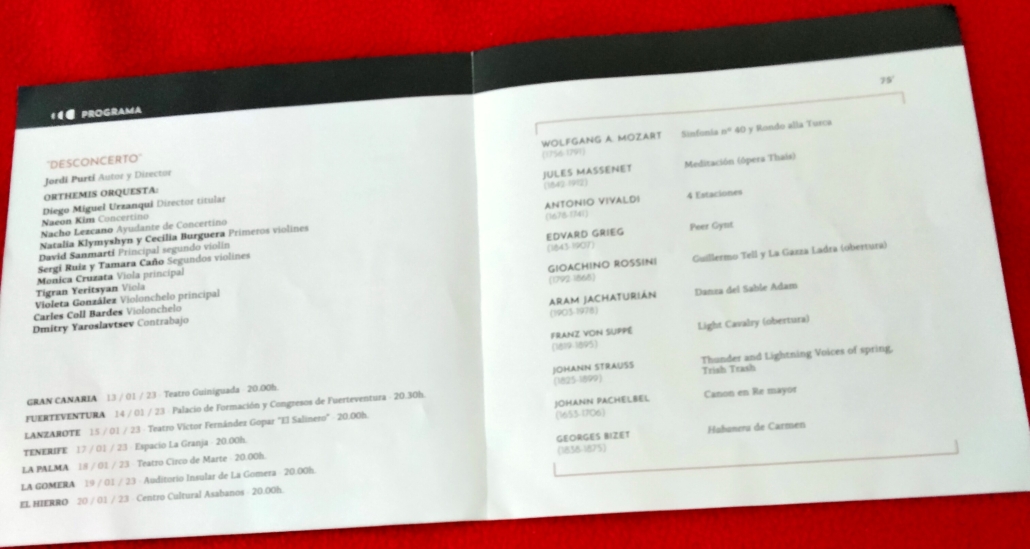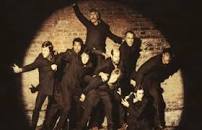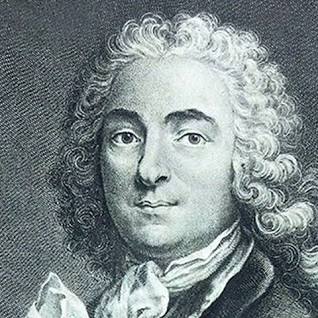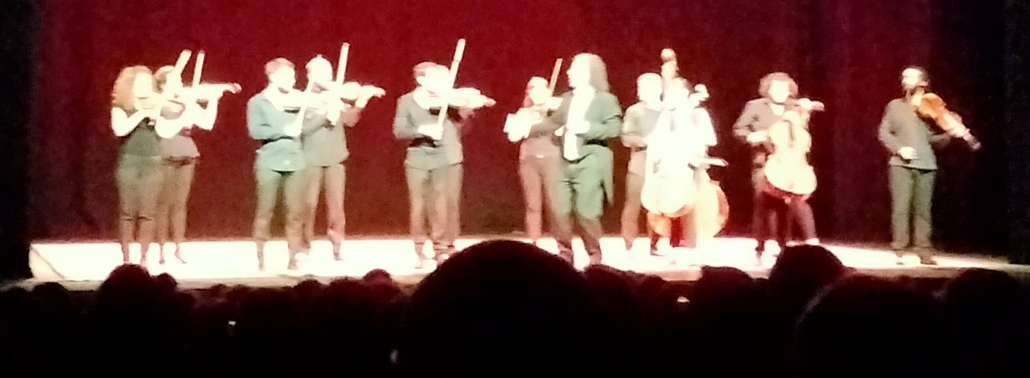A DELIGHTFUL DISCONCERTO
Second Lanzarote concert of the 39th Canary Islands Music Festival
Disconcerto of Bewilderment
January 2023 at El Salinero Teatro, Arrecife
Duration: 75 minutes. leaves
Norman Warwick
bewitched, bothered and Bewildered by
A DELIGHTFUL DISCONCERTO
of music. movement and mischief
‘ Disconcerto ‘, (bewilderment) are an ensemble of 12 string musicians who perform the so-called “Humorous Music”, they are currently touring several of The Canary Islands as part of the 39th Canary Islands Classical Music Festival. Bewilderment, to give it an English name was presented by Jordi Purtí and Orthemis Orquestra and the audience at this Lanzarote concert and including our Sidetracks And Detours team loved the freshness and modernity and the sympathy and empathy the group showed on stage.
This was a star-crossed young love affair between music, theatre, humour and emotion for arts-lovers of all ages and cultures. The presentation is a nice stage action that manages to bring classical music closer to the general public, with virtuosity, imagination and laughter. A show recommended both for music lovers and for those who are less aware of classical music, as well as for children. It was an invitation to seduction, proposed by this group of musician actors who interpret an essential repertoire.

Of course, I wasn´t really aware of the music or ethos of this ensemble when I purchased the tickets, though on the night of the event I was struck by how many parents and quite young children were among the audience. More was clarified when I opened the programme notes (left) and saw names like Mozart, Vivaldi, Grieg, Rossini, Strauss, Pachelbel.
We did not hear full overtures, of course; just the be bests bits,….the few bars we hear on the tv adverts for wallpaper and paint and soft furnishings. This concert married them all together and turned them inside out. In fact a cd recording of this evening might have been called Classical´s Greatest Dance Moments Volume 1.
I can hear the classical music lovers among our readers sighing in exasperation and asking why classical music cannot be left alone to entertain us in the traditional fashion. A response to that might be that classical music concerts in their traditional format could never engage with a young audience the way that this did tonight. And the young people who were here might well now have set out on a life-long romance with this kind of music, whether or not they eschew the kind of pop music that is their current fare.
There was music. movement and mischief in the air, as a young ensemble of a dozen musicians pretty much ignored their musical director from the outset. Halfway through the opening Mozart piece, the conductor was already tearing his hair out as his musicians danced and cavorted even whilst (perfectly) playing their instruments. They constantly swapped positions so the conductor did not know where to point his baton or how to apportion blame. Even so, as Bachman Turner Overdrive might have warned the audience at this stage,…you ain´t seen nothing yet.
Was it Crowded House who sang of For Seasons In One Day. I think it was, and I think they must have had a premonition as they wrote it of Jordi Purti and his Orthemis Orquesta turning Vivaldi´s Four Seasons into Four Seasons in ten minutes.

That, though, was nothing to the drama of the Thunder And Lightning Voices Of Spring that saw the Orchestra crouching for shelter against a wall and lit by a lightning strike, redolent of Paul McCartney and his Band On The Run (right(.
It was obvious throughout this mayhem, however, that these musicians and their conductor loved this music they were playing and although they and he might been teasing each other, respect and love for the music remained paraamount at all times.
I was very pleased about that because included in the classroom rebellion we were witnessing on stage was a generous selection from Pachelbel´s Canon, which is both my favourite classical piece and was also turned into my favourite rock song by American singer-writer John Stewart.
John set a lyric, called Louisianne, to this music and gave it an orchestral setting when recording it. The song is about the relentlessness and meandering of a river and is a regular on my playlists, but I have not heard a live orchestral performance of it until tonight.

Johann Pachelbel, born in September 1653 and who died in 1706; was a German composer, organist, and teacher who brought the south German organ schools to their peak. He composed a large body of sacred and secular music, and his contributions to the development of the chorale prelude and fugue have earned him a place among the most important composers of the middle Baroque era.
Pachelbel’s music enjoyed enormous popularity during his lifetime; he had many pupils and his music became a model for the composers of south and central Germany. Today, Pachelbel is best known for the Canon in D; other well known works include the Chaconne in F minor, the Toccata in E minor for organ, and the Hexachordum Apollinis, a set of keyboard variations.
He was influenced by southern German composers, such as Johann Jakob Froberger and Johann Caspar Kerll, Italians such as Girolamo Frescobaldi and Alessandro Poglietti, French composers, and the composers of the Nuremberg tradition. He preferred a lucid, uncomplicated contrapuntal style that emphasized melodic and harmonic clarity. His music is less virtuosic and less adventurous harmonically than that of Dieterich Buxtehude, although, like Buxtehude, Pachelbel experimented with different ensembles and instrumental combinations in his chamber music and, most importantly, his vocal music, much of which features exceptionally rich instrumentation. Pachelbel explored many variation forms and associated techniques, which manifest themselves in various diverse pieces, from sacred concertos to harpsichord suites.
His Canon In D major, (as adapted by John Stewart) is still popular today, at around 400 years old, perhaps due to its religious connections, as Pachelbel is more well-known in classical circles for this religious or sacred music. It is still perhaps one of the most well-used songs during wedding ceremonies in the Western world.
One might think that such óld´ music might leave people feeling jaded and not really connected to the emotions of the music. However, I would agree with those who simply say that Canon In D , ´sounds´ like a wedding ! It is therefore the perfect song with which to walk down the aisle. Although originally only being intended for perhaps a smaller communal gathering, (the word canon in its title denotes a minor piece often played in the background at small social assemblies) the music is so frequently used that some people are actually surprised that is not an official part of a wedding ceremony.
In fact this baroque piece was only re-discovered during the early part of the 20th century and was only then turned into sheet music. However, it sunk back into obscurity until regaining popularity in the late sixties and seventies.
Perhaps, even today, Pachelbell remains most widely known in classical circles for this religious or sacred music. In comparison to most of his work, Canon In D is a relatively minor and lighter piece. Were it not for its modern popularity at wedding ceremonies it perhaps would be virtually ignored. It was popularised in the film Ordinary People, though this was not really connected to weddings or marriage. However, it seems that only following its inclusion in that film that the music increased in popularity until gradually becoming an almost integral part of the traditional wedding ceremony, surely due to its very attractive sound. It is typically baroque, with its elegance and charm, but at the same time is simple to play. Its repeated melody creates a gorgeous, harmonious sound. That easy tune and memorable harmonies have now come popular and familiar and so nowadays feels and sounds very appropriate for wedding ceremonies.
Because the music is not too complex it is a memorable piece of classical music. Often the Minister of a wedding might, himself, advise the inclusion of the piece, or if music is to be played live at the wedding the musicians themselves might recommend the selection of Canon In D, sometimes as a simple, repetetive tune that can be played as the guests arrive and gather at the church.

Even amidst this concentration of miscreants on stage tonight, the flow of the river, or the haunting repetetiveness of Canon In D, was never blocked nor re-directed. For me that meant I could enjoy listening to this lovely piece of Pachelbell whilst singing silently in my head the wonderful lyrics by John Stewart that turned a four hundred year old piece of baroque music into a winding river through a landscape of life and codes to live by.
John Stewart, a singer/songwriter known for his classic album California Bloodlines, passed away after a stroke in San Diego 2008 at the age of 68. As a teenager John performed and recorded three albums with his folk group Cumberland Three and in 1961, he joined The Kingston Trio, replacing original member Dave Guard.
He left the group in 1967 to pursue a solo career, where he became the driving force behind the genre that I so love, now known as Americana. In that same year, he joined Senator Robert F. Kennedy on his campaign trail for the Democratic presidential nomination, which had a profound effect on his song-writing. California Bloodlines, released early in his solo career, was included in Rolling Stone magazine’s list of the 200 best albums of all time.
Stewart enjoyed song-writing success, penning such hits as “Daydream Believer,” a No.1 record for the Monkees, and “Runaway Train” for Rosanne Cash. In 1979, Stewart’s Top 10 album, Bombs Away Dream Babies, spawned his biggest hit, the Top 5 “Gold,” which featured collaborations with Fleetwood Mac’s Lindsey Buckingham and Stevie Nicks. Stewart remained a fixture on the folk circuit, and in 2000 he teamed up with former Kingston Trio band-mate Nick Reynolds, to create the Trio Fantasy Camp in Scottsdale, Arizona.
I was privileged to interview John Stewart on a number of occasions and he often made the same references to Pachelbell´s piece as are noted above.
It was in this piece of music that tonight´s conductor re-established his authority.

Jordi Purti (left) is a Spanish mime, clown, actor, author and director. He trained at the Barcelona Theatre Institute before joining the company Les Joglars. He began writing and directing his own creations in 1991. This is how Hop! Era and Operetta awards and performances around the world are multiplying. Jordi Purti has more than fifty completed projects to date, Desconcerto is one of the latest. Its shows consist of twelve musicians from the Orquestra de Cambra l’Emporda, from Catalonia. They offer a humorous, hybrid, supercharged concert-show, mixing classical and contemporary with virtuosity. The orchestra has more than 2,500 concerts on five continents in 27 years of existence
Tonight, in his role as conductor, he was able to indicate a clever turning of the tide, however, using this music to signal his ability,: at the raising or lowering of an arm, to controlled the volume of the sounds the orchestra made, and glide them into calmer waters.
He nevertheless still looked flummoxed when some members of his orchestra jumped into a street dance and hip hop in a down wid da kids style and when a couple of small congregations in his musical ensemble and the evening erupted into a gang fight to the music of West Side Story, recalling the Capulets And the Montagues the conductor seemed to have lost the battle for parity let alone authority.

There had even been a very cleverly orchestrated bull fight set to music, but what we were witnessing here tonight, was not only musical excellence but also a synchronicity of human movement of the highest level. This was achieved by free-form fluidity rather than by a procession of choreographed steps. We had musicians hanging round the neck of a partner to play another person´s instruments and we had I-fancy-you flirtations.
Things were finally sealed with a kiss and love and peace reigned over the music at last. The tide had turned and Autor y Director Putri had regained control over his Orthemis Orquesta (right)., of which he took full advantage with the help of a hand-held control mechanism that turned one, some or all of his musicians on or off at his will…
This had all been bewildering in a way that had the audience mostly roaring with laughter, particularly at a piece which had a student in the ´class room´ on stage, typing a letter to the rhythm and tune and line-ending ping on an old fashion type-writer in a sketch I remember vividly from my childhood watching, on a black and white telly: what was probably a Royal Command Performance performance or some such. It was funny then, and it was funny tonight, and then rendered hilarious when a more ´modern´ girl in the class also tapped out the same rhythm on her mobile phone, to the chagrin of her tormented conductor.
Only minutes later, though, the audience who had earlier been laughing at his hapless efforts to control his musicians, were seeking the conductor´s approval by trying to comply with his instruction of how to provide a hand clapping accompaniment with a 2-3- 5 rhythm between appointed sections of the audience. This is a formation taken by fans at many great football stadiums around the world but I´m not sure we bore any comparison with The Kop, Stretford End or Noucamp.
As we left and crossed the Formula 1 track that is outside the El Salinero Theatre we could hear young children laughing about the antics of the orchestra even as their parents were asking them what they thought of the music,,…..and do you know what, the responses sound happy and positive.

So, as had been obvious by the laughter during the performance the audience had enjoyed themselves and were taking happy memories home with them and it is possible that members of this somewhat non-traditional audience for this genre of muisc might well return for more.
What, though, had the sidetracks & detours generation of over seventies, thought of it?
Well, we four were astonished and amazed. In the words of Lorenz Hart (right)) we were bewitched, bothered and bewildered by it all but nevertheless agreed that we had heard most of our favourite music at one sitting, delivered by six males and six females who could really play,
And what will happen when they come to play in Lanzarote again ?
Well, in the words of The Kaiser Chiefs, …. I predict a riot.!




Leave a Reply
Want to join the discussion?Feel free to contribute!